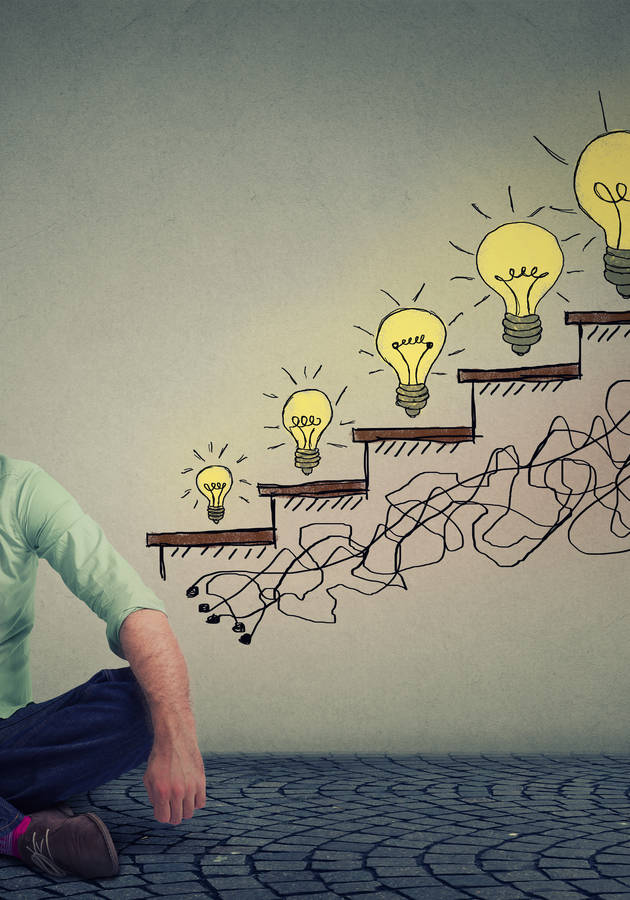There’s a sonnet written by Bohemian-Austrian poet Rainer Maria Rilke entitled “Archaic Torso of Apollo” which ends with a sudden, but brilliant punchline: “You must change your life.” Indeed, you must. Because chances are, you’re currently living what existentialists deem to be “an inauthentic life,” that is, a life designed by others for other people, and not by you for yourself. It’s time you fixed that. It’s time you stopped trying to be someone you aren’t and don’t even want to be. It’s time you started believing that, as imperfect as you might be, you are enough just as you are, and that you are worthy of love and belonging precisely because of your imperfection, not in spite of it.
In “The Gifts of Imperfection,” Brené Brown – a leading expert on vulnerability, authenticity and shame – shares 10 guideposts on the power of wholehearted living, which she defines as “a way of engaging with the world from a place of worthiness.” Get ready to hear them out and prepare to discover how to embrace your imperfection and make change happen by being accountable to nobody else but your authentic self!
Wholehearted living
Having dedicated her career to studying difficult emotions such as shame, fear, and vulnerability, Brown discovered early on that the majority of people in the world are afraid to let their true selves be seen and known. So, she wrote a book about shame-resilience and developed a related curriculum for mental health and addictions professionals. In November 2006, however, everything changed. That was the month that Brown first started thinking about the exceptions among her research participants. And that changed everything.
“I heard stories about the power of embracing imperfection and vulnerability,” she remembers. “I learned about the inextricable connection between joy and gratitude, and how things that I take for granted, like rest and play, are as vital to our health as nutrition and exercise. These research participants trusted themselves, and they talked about authenticity and love and belonging in a way that was completely new to me.”
Even before she knew precisely what she meant by it, Brown decided to name these outliers the Wholehearted. Then, she began searching for them – purposefully and persistently. Then, she started quizzing them and, in the process, she learned as much as she could about their life choices. That was the moment when she decided to bring “awareness and clarity to the constellation of choices that lead to Wholeheartedness” and share what she learned from the people dedicated to living and loving with their whole hearts with the rest of us. That’s how “The Gifts of Imperfection” was born. That’s also how the concept of “Wholehearted living” – now a globally recognizable antidote to shame – first came into being.
“Wholehearted living,” explains Brown at the outset of her game-changing book, is “about engaging in our lives from a place of worthiness. It means cultivating the courage, compassion, and connection to wake up in the morning and think, ‘No matter what gets done and how much is left undone, I am enough.’ It’s going to bed at night thinking, ‘Yes, I am imperfect and vulnerable and sometimes afraid, but that doesn’t change the truth that I am also brave and worthy of love and belonging.’” Consequently, rather than being a one-time choice, wholehearted living is a process. In fact, as Brown says, it’s the journey of a lifetime. Time to take the first step.
The things that get in the way
The United States is not merely the richest country in the world, but the richest country in the history of humankind. And yet, modern Americans are “the most obese, medicated, addicted, and in-debt Americans” in the entire history of the country. The same holds true for many countries in the developed world. Even though its people have access to so many things our ancestors could have never even dared dreaming about, most of them are unhappy. Case in point, the self-help movement originated in the West. Moreover, it is currently at its historic, just at the beginning of the 21st century, inarguably the most advanced time since the dawn of civilization. What’s the problem? Where does this alarming discrepancy stem from?
Brown believes it’s in the societal fragmentation that Western radical individualism has caused. Even though technologically we have never been more connected, we have never been more alone as well. We suffer through our hurts and pains in isolation for fear of what other people might think of us when they see us being vulnerable. We even love alone. “We don’t talk about the things that get in the way of doing what we know is best for us, our children, our families, our organizations, and our communities,” bemoans Brown. “We don’t talk about what keeps us eating until we’re sick, busy beyond human scale, desperate to numb and take the edge off, and full of so much anxiety and self-doubt that we can’t act on what we know is best for us.”
The underlying reason? Shame. Often referred to as “the swampland of the soul” in Jungian circles, shame is basically “the fear of being unlovable” which is to say, “the total opposite of owning our story and feeling worthy.” That’s pretty much how Brown defines it: as “the intensely painful feeling or experience of believing that we are flawed and therefore unworthy of love and belonging.” The truth – the painful truth – is that shame forms a vicious cycle: the more you’re ashamed of talking about it, the more control it will gain over your life. Frighteningly, all this vicious cycle needs to be put into motion are three things: secrecy, silence, and judgment. Fortunately, there are also three things that can help you break the cycle: courage, compassion, and connection.
The gifts of imperfection
To let go of the things that get in your way, to be able to embrace your own imperfections, to learn to live and love from a place of worthiness, you need no more than three things: courage, compassion, and connection. They are the main components of Wholehearted Living. So, let’s have a look at each.
- Courage. The root of the word “courage” is cor – the Latin word for heart. Even though nowadays it’s taken to be synonymous with “heroics,” originally, its meaning was “to speak your mind by telling all your heart.” That’s how Brown understands courage too. “Heroics is often about putting our life on the line,” she writes. “Ordinary courage is about putting our vulnerability on the line. In today’s world, that’s pretty extraordinary.”
- Compassion. The word “compassion” is derived from the Latin words cum, meaning “with,” and pati, meaning “to suffer.” Hence, to be compassionate means to be able “to suffer with” someone. “With” is the keyword here. As American Buddhist nun Pema Chödrön advises, compassion should never be a relationship between a healer and a wounded person, but a relationship between equals. Compassion stems from the recognition of our shared humanity.
- Connection. As Aristotle wrote, human beings are, by nature, “social animals.” We can’t help but be: biologically and physiologically, we are wired for connection. But then there’s connection and connection. The one Brown is interested in can be defined as “the energy that exists between people when they feel seen, heard, and valued; when they can give and receive without judgment; and when they derive sustenance and strength from the relationship.”
To be courageous, compassionate, and connected, the people who live and love wholeheartedly know how and why to DIG deep within themselves when it matters. Namely, when they are exhausted and overwhelmed by life, they get:
- Deliberate in their thoughts and behaviors;
- Inspired to make new and different choices;
- Going. They take action.
That, arguably, should be your most important takeaway from this section. In the West, we tend to believe that our thoughts and emotions influence our actions, so we try to change the former. On the other hand, in the East, they focus on teaching people to accept their thoughts and emotions without trying to control them, because they believe that both of them will change as a result of their actions. You get courage by doing courageous acts. It is only compassion that can beget compassion. Connection, finally, is the inevitable result of connecting.
Guideposts No. 1-3: Authenticity, self-compassion and a resilient spirit
Courage, compassion and connection only work when they are exercised daily. To turn them into habits, use Brown’s 10 guideposts for the Wholehearted Journey. Here are the first three.
1.Authenticity: letting go of what people think. Authenticity isn’t a quality you have or lack, but a choice – the choice to let your true self be seen by others. It is, consequently, “the daily practice of letting go of who you think you’re supposed to be and embracing who you really are.” Stop living your life backward. Instead of trying to earn more money and things in order to have more time to do more of what you want, start doing what you really need to do today to become who you want to be tomorrow. Take the risk to be true to yourself. It makes all other risks worthwhile.
2.Self-compassion: letting go of perfectionism. Perfectionism is not about striving to be your best, and even less about self-improvement: it is almost always about trying to earn approval and acceptance. Healthy striving is self-focused, explains Brown; it can be summed up in the question: “How can I improve?” But perfectionism is other-focused: it is what stems from the question: “What will they think?” To arrive at a place of worthiness in life, you must let go of the “self-destructive and addictive belief system” that perfectionism entails. And to do that, practice self-compassion. If you don’t know where to start, according to Dr. Kristin Neff, self-compassion consists of three elements: self-kindness, common humanity and mindfulness. So, start there.
3.A resilient spirit: letting go of numbing and powerlessness. Resilient people share several traits. In addition to being resourceful and connected to their families and friends, they are also more likely to seek help and less likely to believe in things such as destiny. However, perhaps the most important aspect of resilient people – the very foundation of their resilience – is their spirituality, their firm belief in Something Bigger. This doesn’t mean that resilient people are religious, but it does mean that Wholehearted people recognize and celebrate that “we are all inextricably connected to each other by a power greater than all of us.” Cultivating resilience starts with critical awareness. More practically, it entails letting go of numbing activities such as Facebook and TV which contribute to your general feelings of powerlessness. Resilience, after all, is all about power.
Guideposts No. 4-6: Gratitude and joy, intuition and creativity
The second set of three guideposts for the Wholehearted Journey concern gratitude and joy, intuition and trusting faith, as well as creativity. Let’s say a few words about each.
4.Gratitude and joy: letting go of scarcity and fear of the dark. “As the body without spirit, so faith without works is dead,” says the Bible. The same applies to gratitude: you must practice it to be grateful. That’s why the Wholehearted keep gratitude journals, do daily gratitude meditations and prayers, and even stop during their most stressful days to say out loud the following words: “I am grateful for….” Gratitude, they say, is attitude. Well, so is joy. Contrary to popular opinion, joy is something you choose to have in your heart, not something that can only be triggered by external events. The latter is happiness. Unlike happiness – which is temporary by design – joy can be constant. Because it can be constantly fed with gratitude.
5.Intuition and trusting faith: letting go of the need for certainty. Intuition is not irrational: it’s just another way of thinking. More specifically, rapid-fire, subconscious, associative thinking. Therefore, what silences your gut from time to time is not your brain per se, but your brain’s innate need for certainty. In view of that, we can define intuition as our “ability to hold space for uncertainty and our willingness to trust the many ways we’ve developed knowledge and insight, including instinct, experience, faith, and reason.” Of the four, faith deserves a special recognition. Because faith, essentially, is not knowledge, but something beyond. As mysterious as it might seem, faith is necessary – it’s what gives you courage to thread unchartered territories. And that’s how adventures begin.
6.Creativity: letting go of comparison. Comparison, in the words of Brown, is “all about conformity and competition.” In her dictionary, rather than being mutually exclusive, the two complement each other. Because, she explains, comparison entails two things – fitting in and standing out. Creativity, on the other hand, is an expression of authenticity. The fact that it is self-oriented makes it the perfect antidote to comparison (which, by its very nature, is other-oriented). The great part? In the absence of comparison, “concepts like ahead or behind or best or worst lose their meaning.” And the world becomes a playground.
Guideposts No. 7-10: Play, calmness, meaning and laughter
Let’s round things off with a few words on Brown’s final four guideposts:
7.Play and rest: letting go of exhaustion as a status symbol and productivity as self-worth. It’s not an exaggeration: there are many people in the world that have actually died from exhaustion. So many, in fact, that the Japanese even have a word for it: karōshi, meaning “overwork death.” How have we allowed this to become a thing? After all, to paraphrase Mark Twain, nobody has ever regretted, on their deathbed, the fact that they didn’t spend a few hours more of their lives working. So, just stop fearing that you’ll miss out on something by not staying late at work. Because, otherwise, you’ll definitely miss out on the good things in life, such as rest and play.
8.Calm and stillness: letting go of anxiety as a lifestyle. There’s a difference between calm and stillness. Calm, as defined by Brown, entails “creating perspective and mindfulness while managing emotional reactivity.” Stillness, on the other hand, means “opening up an emotionally clutter-free space and allowing ourselves to feel and think and dream and question.” In other words, you need stillness to be calm, and calm to improve your emotional quotient. Without stillness and calm, you risk losing yourself in the overly anxious world of today. So, give yourself more time “to do less and be less.” Because less is sometimes more.
9.Meaningful work: letting go of self-doubt and “supposed to.” Unless it’s dying or paying taxes, you’re actually not supposed to do anything in life! So, why should you feel self-doubt, fear, and anxiety because of all these “supposed-to-do’s”? Just stop! You owe it to yourself. You owe it to the world as well. To quote American philosopher Howard Thurman, “Don’t ask what the world needs. Ask what makes you come alive, and go do it. Because what the world needs is people who have come alive.”
Laughter, song, and dance: letting go of being cool and “always in control.” Though Brown attributes the following quote to Mark Twain, the truth is we don’t really know who actually said it first. Whoever it was, he or she was more than right when he advised the following: “Dance like no one is watching. Sing like no one is listening. Love like you’ve never been hurt and live like it’s heaven on Earth.” If what’s stopping you from doing these things is a fear of being “uncool,” then you’re missing out on your life for the wrongest reason imaginable. Because you know what’s the coolest thing ever? Living your life!
Final notes
Brené Brown is certainly one of the most respected and admired motivational public speakers of the 21st century. There’s a reason why. There’s also a reason why “The Gifts of Imperfection” is, arguably, her best-known work. Named one of the “Five Books That Will Actually Change Your Outlook on Life” by Forbes magazine, it is not just another self-help do-this-don’t-do-that manual, but an inspiring guide to more authentic living. It is imperfect, yes, but it isn’t ashamed to admit this. And that’s the point, isn’t it?
12min tip
To cultivate worthiness, practice courage, compassion, and connection in your daily life. Practice is the keyword here: you don’t get courageous, compassionate and connected by thinking about courage, compassion, and connection. You get it by actually connecting, and by doing courageous and compassionate acts.




























